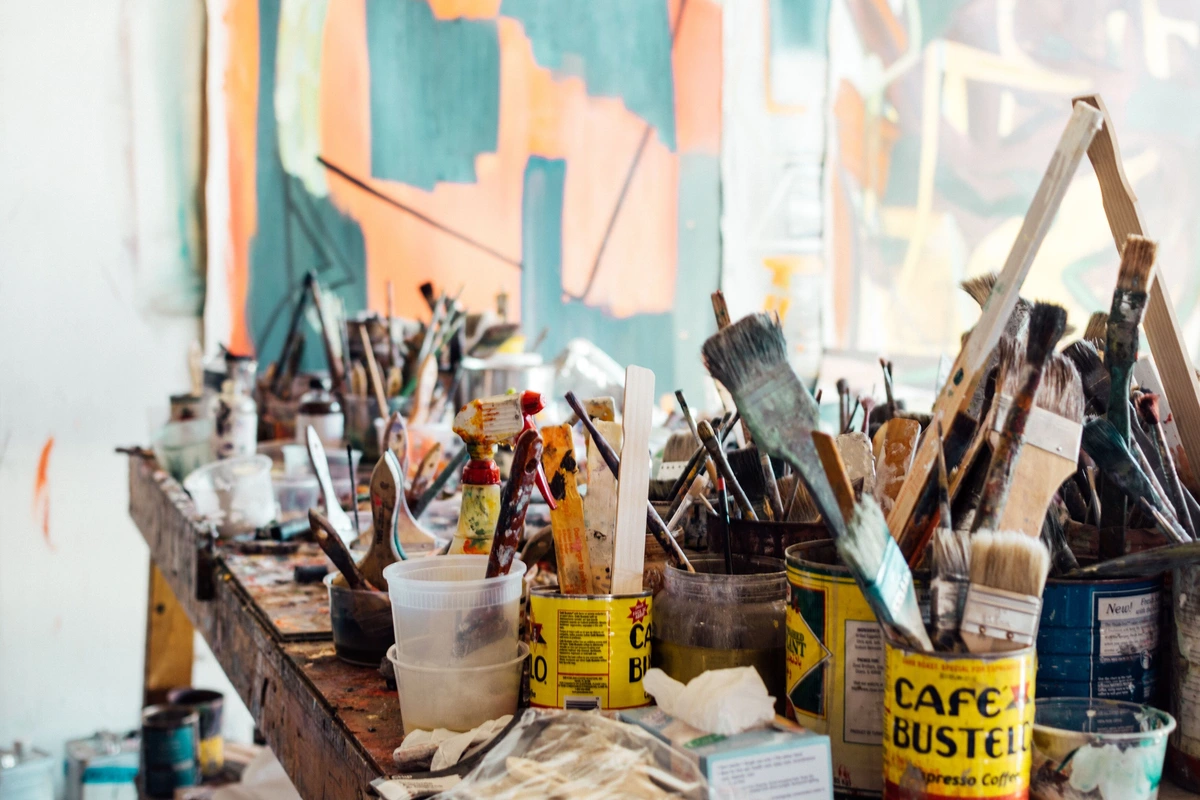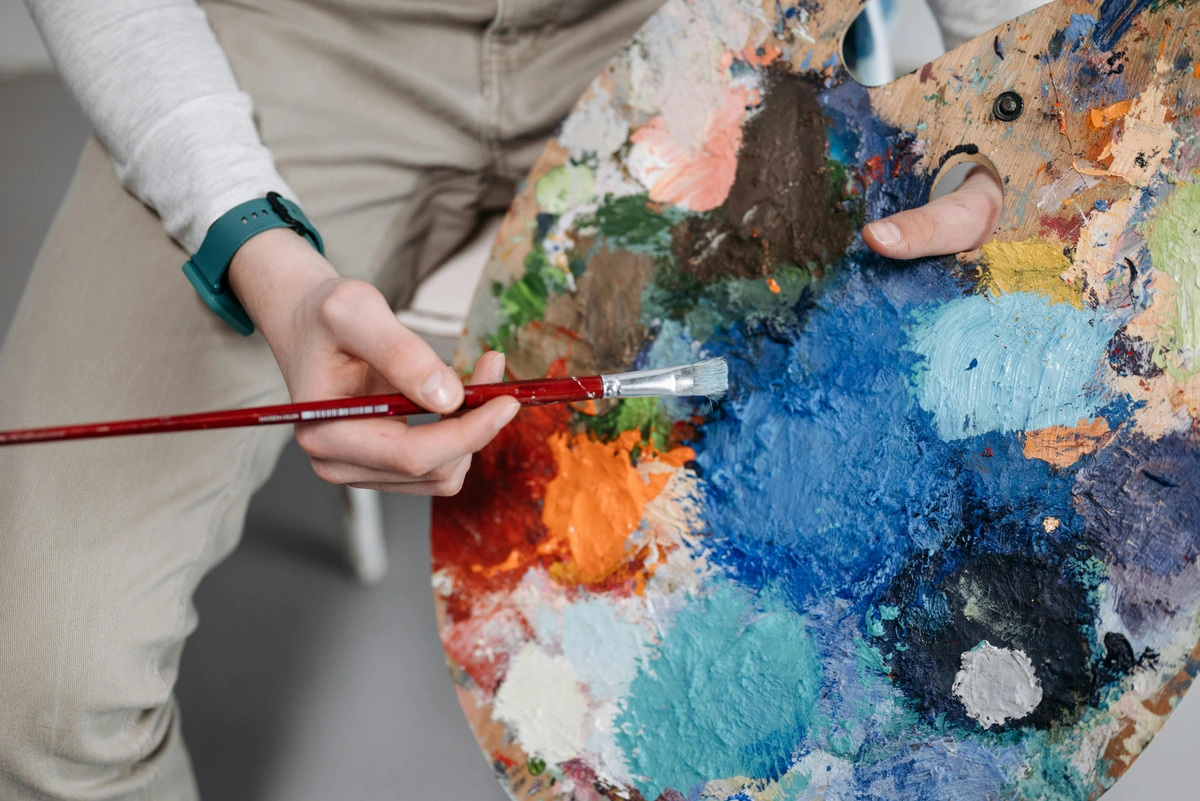Overcoming the Artist's Block: My Personal Journey Through Creative Hurdles in Abstract Painting
Oh, the dreaded artist's block. It's like your muse has packed her bags, left a vague note about 'needing space,' and vanished into thin air. If you're an abstract painter, this particular flavor of creative stagnation can feel even more bewildering. When your canvas is a blank slate of infinite possibilities, that freedom can suddenly morph into a paralyzing void. Trust me, I've been there, staring at a pristine white canvas, feeling as empty as my coffee mug on a Monday morning.
The Many Faces of the Block
It’s easy to think of a block as simply 'not having ideas.' But in my experience, it's a far more nuanced, often sneaky beast. Sometimes it’s a nagging voice of perfectionism whispering that anything you do will be 'not good enough.' Other times, it's the sheer exhaustion of trying too hard, a creative burnout where your brain just says, 'Nope, not today, chief.' Or maybe you're scrolling through Instagram, seeing everyone else's seemingly effortless masterpieces, and the comparison monster rears its ugly head. I once spent an entire week convinced my art looked like a toddler's finger painting after a particularly inspiring (read: intimidating) visit to a gallery. That wasn't a lack of ideas; it was a crisis of confidence.
Why Abstract Painting is Different (and Harder, Sometimes)
Unlike a landscape painter who can always 'just paint a tree,' abstract artists don't have that ready-made subject matter. Our canvas is a dialogue between emotion, intuition, and pure form. This beautiful freedom, as I mentioned, can be terrifying. It demands something deeper, more introspective. It's about letting go and embracing spontaneity, as I often explore in my thoughts on the art of intuitive painting. When that intuitive well feels dry, the struggle is real.
My Toolkit for Kicking the Block
So, how do we coax that elusive muse back? Or better yet, how do we realize she never left, but was just hiding under a pile of laundry and self-doubt? Here are a few things that have pulled me back from the brink, sometimes with a gentle nudge, sometimes with a metaphorical kick in the pants.
1. Acknowledge and Observe, Don't Fight
My first instinct when a block hits is usually to panic. 'Oh no, I'm never going to paint again! This is it! My career is over!' (Yes, my internal monologue can be a bit dramatic.) But I've learned that fighting the feeling only strengthens it. Instead, I try to acknowledge it. 'Okay, I feel stuck. What does this feeling actually feel like?' Sometimes it’s a heavy weight, sometimes an agitated restlessness. Just observing it, without judgment, can lessen its grip.
2. Change Your Scenery (or Your Brain's Scenery)
Staring at the same studio wall, surrounded by half-finished paintings and dried paint tubes (guilty!), is not going to magically unlock anything.

Get out! Go for a walk. Visit a museum (even if it's not my own in Den Bosch, though you're always welcome there!). Look at art – not just abstract, but everything. Sometimes seeing the sheer audacity of works like those in famous abstract art or diving into a guide to abstract expressionism can jolt something loose. Absorb new perspectives without the pressure to create.
3. The "No-Pressure" Play
This is my secret weapon against the perfectionism monster. When I feel a block, I tell myself, 'Okay, today we're making bad art.' Or 'Today, we're just playing.' I might use a completely different medium, explore new mixed media techniques, or simply practice basic brushstrokes on scrap paper.

The goal isn't a masterpiece; it's simply to move paint, to make a mark, to get the creative muscles twitching again. Sometimes, these 'bad' sessions lead to the most surprising breakthroughs. It’s like when you’re not trying to find your keys, and suddenly they appear.
4. Reconnect with Your 'Why'
Why do you paint? Seriously. In the thick of a block, it’s easy to forget the pure joy, the compulsion, the unique voice that led you to abstract art in the first place. I often revisit my own personal philosophy and artistic vision to ground myself. Looking back at my artistic timeline can also remind me of all the other blocks I've overcome and how much I've grown. Sometimes, the block is a sign you've lost connection with your authentic self in your work. What does your heart want to say, even if it's just a whisper?
The Emotional & Mental Game
Overcoming artist's block isn't just about techniques; it's a profound act of self-compassion. You wouldn't yell at a seed for not growing into a tree fast enough, would you? Treat your creative process with the same patience. Understand that creativity isn't a faucet you can just turn on and off. It ebbs and flows, like the tides. Sometimes, you need to step away completely, let your subconscious work its magic. Go live life! Experience things! Accumulate new feelings and observations, and when you return to the studio, you might find that the block has dissolved, replaced by a fresh wave of inspiration. It's often when we stop trying so hard that the ideas finally decide to show up.
FAQ
Question | Answer |
|---|---|
| What is artist's block? | Artist's block is a period of creative stagnation or inability to produce new work, often characterized by a lack of inspiration, motivation, or fresh ideas. It can manifest as feeling stuck, overwhelmed, or simply unable to begin or continue a project. |
| How long does artist's block last? | The duration varies greatly from person to person and situation to situation. It could be a few hours, days, weeks, or even months. There's no set timeframe, but recognizing it and actively employing strategies (like those discussed above) can often shorten its grip. |
| Can watching other artists help overcome a block? | Absolutely! Observing how other artists work, studying their techniques, or simply appreciating their finished pieces can be incredibly inspiring. It can spark new ideas, remind you of possibilities, or simply rekindle your passion for art. Just be mindful not to let it turn into comparison or self-doubt. |
| Is it okay to take a break from creating during a block? | Yes, absolutely! Sometimes, a break is precisely what's needed. Stepping away allows your mind to rest, process, and absorb new experiences without pressure. Engaging in other activities, pursuing hobbies, or simply living life can surprisingly recharge your creative batteries. |
Conclusion
Artist's block is not a sign of failure; it's a normal part of the creative journey, especially for those of us navigating the boundless world of abstract art. It's a signal, perhaps, to pause, reflect, and recalibrate. By understanding its various forms, embracing self-compassion, and equipping ourselves with a toolkit of personal strategies, we can transform these creative hurdles into stepping stones for deeper artistic growth. And remember, the act of creating, even when challenging, is a profound expression of self. Keep experimenting, keep exploring, and when you're ready to share your journey, my art for sale might just offer a new starting point for someone else's inspiration.